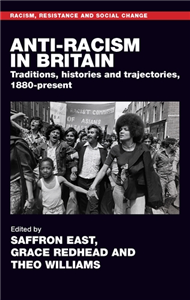Anti-racism in Britain
Traditions, histories and trajectories, 1880-present
by Saffron East, Grace Redhead, Theo Williams
Description
More Information
Rights Information
Albania, Algeria, Angola, Argentina, Armenia, Australia, Austria, Bahrain, Belgium, Belize, Benin, Bolivia, Bosnia and Herzegovina, Botswana, Brazil, Bulgaria, Burkina Faso, Burundi, Cameroon, Canada, Cape Verde, Central African Republic, Chad, Chile, China, Colombia, Comoros, Congo [DRC], Congo, Republic of the, Costa Rica, Ivory Coast, Croatia, Czech Republic, Denmark, Djibouti, Ecuador, Egypt, El Salvador, Equatorial Guinea, Eritrea, Estonia, Ethiopia, Faroe Islands, Finland, France, French Guiana, Gabon, Gambia, Georgia, Germany, Ghana, Greece, Guatemala, Guinea, Guinea-Bissau, Guyana, Honduras, Hongkong, Hungary, Iceland, India, Indonesia, Iran, Iraq, Ireland, Israel, Italy, Japan, Jordan, Kazakhstan, Kenya, Kuwait, Latvia, Lebanon, Lesotho, Liberia, Libya, Lithuania, Luxembourg, Macau, China, Macedonia [FYROM], Madagascar, Malawi, Malaysia, Mali, Malta, Mauritania, Mauritius, Mayotte, Mexico, Mongolia, Montenegro, Morocco, Mozambique, Namibia, Netherlands, New Zealand, Nicaragua, Niger, Nigeria, Norway, Oman, Pakistan, Panama, Paraguay, Peru, Philippines, Poland, Portugal, Puerto Rico, Qatar, Reunion, Romania, Russia, Rwanda, Saint Helena, Sao Tome and Principe, Saudi Arabia, Senegal, Serbia, Seychelles, Sierra Leone, Singapore, Slovakia, Slovenia, Somalia, South Africa, South Korea, Spain, Sri Lanka, Sudan, Suriname, Swaziland, Sweden, Switzerland, Syria, Taiwan, Tanzania, Thailand, Timor-Leste, Togo, Tokelau, Tunisia, Turkey, Uganda, Ukraine, United Arab Emirates, United Kingdom, United States, Uruguay, Venezuela, Vietnam, Western Sahara, Yemen, Zambia, Zimbabwe, South Sudan, Cyprus, Palestine, Bangladesh, Cambodia, Liechtenstein, Azerbaijan, Jamaica, Kyrgyzstan, Dominican Republic, Myanmar, Monaco
Endorsements
Is there a 'tradition' of British anti-racism? This volume brings together new, original scholarship to demonstrate that, if there is a meaningful tradition of 'British' anti-racism, it was created by citizens and subjects and it has been shaped by shifting imperial and transnational politics as well as national and local contexts. The volume traces how the history of anti-racism in Britain has been characterised at one end of the spectrum by paternalism and at the other end by solidarity, identifying this paternalistic-solidaristic spectrum as a major axis within British political culture. It examines the anti-racist and anti-imperialist alliances forged during the late nineteenth century, explores how anti-racist action shifted to decolonial state resistance and organising in the embers of empire, and analyses how histories and memories of racism and anti-racism were reframed and expressed at the turn of the millennium. Contributors identify moments of multi-ethnic solidarity between a range of communities and organisations, from trade unions to community 'self-help'. Chapters in this volume also pay attention to how cultural forms play a role in racial formation and anti-racist activism and alliances. Crucially, this volume explores anti-racism as a shifting and ongoing project of resistance with multiple points of geographic, intellectual and political origin and highlights a number of key continuities and fractures in the history of anti-racism in Britain.
Reviews
Is there a 'tradition' of British anti-racism? This volume brings together new, original scholarship to demonstrate that, if there is a meaningful tradition of 'British' anti-racism, it was created by citizens and subjects and it has been shaped by shifting imperial and transnational politics as well as national and local contexts. The volume traces how the history of anti-racism in Britain has been characterised at one end of the spectrum by paternalism and at the other end by solidarity, identifying this paternalistic-solidaristic spectrum as a major axis within British political culture. It examines the anti-racist and anti-imperialist alliances forged during the late nineteenth century, explores how anti-racist action shifted to decolonial state resistance and organising in the embers of empire, and analyses how histories and memories of racism and anti-racism were reframed and expressed at the turn of the millennium. Contributors identify moments of multi-ethnic solidarity between a range of communities and organisations, from trade unions to community 'self-help'. Chapters in this volume also pay attention to how cultural forms play a role in racial formation and anti-racist activism and alliances. Crucially, this volume explores anti-racism as a shifting and ongoing project of resistance with multiple points of geographic, intellectual and political origin and highlights a number of key continuities and fractures in the history of anti-racism in Britain.
Author Biography
Saffron East is Adrian Research Fellow at Darwin College, University of Cambridge Grace Redhead is a Postdoctoral Research Fellow at the University of Exeter Theo Williams is a Lecturer in Social History at the University of Glasgow
Manchester University Press
Manchester University Press is a leading UK publisher known for excellent research in the humanities and social sciences.
View all titlesBibliographic Information
- Publisher Manchester University Press
- Publication Date November 2024
- Orginal LanguageEnglish
- ISBN/Identifier 9781526171115 / 1526171112
- Publication Country or regionUnited Kingdom
- FormatPrint PDF
- Pages288
- ReadershipGeneral/trade; College/higher education; Professional and scholarly
- Publish StatusPublished
- Dimensions234 X 156 mm
- Biblio NotesDerived from Proprietary 5856
- SeriesRacism, Resistance and Social Change
- Reference Code15443
Manchester University Press has chosen to review this offer before it proceeds.
You will receive an email update that will bring you back to complete the process.
You can also check the status in the My Offers area

Please wait while the payment is being prepared.
Do not close this window.



